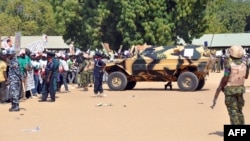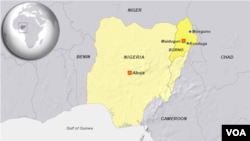With Boko Haram intensifying its onslaught just weeks ahead of national elections, governors in the three Nigerian states hardest hit by the radical group on Tuesday called for United Nations and foreign military intervention to stem the violence.
The plea by the governors of Adamawa, Yobe and Borno state underscored the chaos that has gripped northeast Nigeria, as well as rising tensions ahead of the Feb. 14 vote.
Boko Haram’s five-year insurgency has intensified in the past year. The government's handling of the security situation has become a major issue in the election campaign, which pits incumbent Goodluck Jonathan against former military ruler Muhammadu Buhari.
After years of localized fighting and terror attacks, the group, whose ideology is a mix of Islamic radicalism and historic political grievances, burst into the global consciousness last year when it kidnapped scores of young girls from Borno state. That prompted a viral Internet campaign under the hashtag #BringBackOurGirls.
In recent weeks, the attacks have reached new intensity. Over the weekend, militants seized an army barracks in Borno state and attacked the state capital, Maiduguri. Earlier this month, fighters took over a military base in the Borno town of Baga, an attack that killed scores of civilians and sent thousands fleeing into neighboring Chad.
At a news conference Tuesday in Yola, the capital of Adamawa state, Governor James Ngilari told reporters that the United Nations and other world powers must come to the aid of Nigerians. Ngilari, who said he spoke on the behalf of governors in Borno and Yobe, said the region needed not only food, but military intervention.
In an interview later with VOA, Ngilari’s spokesman, P.P. Elisha, asked why an international military air campaign could be mounted against Islamic State militants in Iraq and Syria, but not in northeast Nigeria.
“Here is a situation where thousands and thousands are being killed,” Elisha said. “We agree the international community has been helping, in the tune of providing humanitarian assistance and other logistics. But what is important is to do is to end the insurgency.
“It is important for these people to be able to go back to their … homes. It is better than the aid being given,” he said.
“Like they are doing in the case of [Islamic State] in the Middle East, they could do the same thing in the northeast [of Nigeria],” Elisha said.
On Monday, General Chris Olukolade, a Nigerian military spokesman, told VOA that troops were conducting an operation to take back the barracks in Monguno, about 110 miles northwest of Maiduguri.
In a series of Twitter messages a day earlier, the military said "substantial amounts of heavy weapons" had been captured and that both sides suffered casualties.
A top security advisor to the Jonathan government, Sambo Dasuki, suggested last week that elections might be delayed, due to administrative problems such as voter cards not being completely distributed.
But the main opposition party, the All Progressives Congress, which represents Buhari, said it would not accept any postponement. Lai Mohamed, a top official in the opposition party, also accused Jonathan of lacking the political will to fight Boko Haram.
“You should ask [Jonathan], what does he expect the opposition to do? Of course, we are going to fight the government when our soldiers go to the battlefield without any ammunition, when our soldiers have to buy their own medication and their own food,” Mohamed told VOA. “You can’t expect the opposition to support that kind of thing.
In a visit to Nigeria on Sunday, U.S. Secretary of State John Kerry said the United States was committed to helping fight Boko Haram, but the U.S. response would hinge on how the well the election was conducted.
Ibrahim Ahmed is a reporter for VOA’s Hausa Service. Mike Eckel is a reporter for VOA’s English Web Desk. James Butty also contributed to this report.





